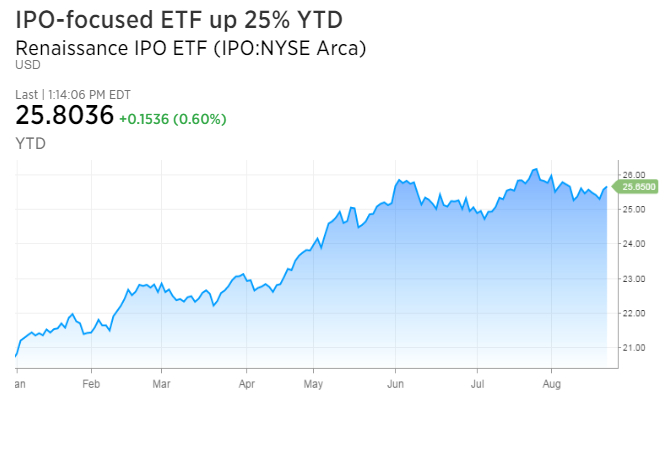I got a call Thursday morning from Kathleen Smith, who runs Renaissance Capital, an investment firm that specializes in investing in IPOs and also runs the Renaissance Capital IPO ETF (ticker: IPO), a basket of the largest 60 or so most recent offerings.
She had just finished reading the S-1 filing of a proposed IPO called Social Capital Hedosophia Holdings, a holding company that is aiming to raise $500 million in an IPO that will then go out and buy other tech companies who have been reluctant to go public.
The S-1 notes that tech startups have plenty of access to private venture money but don’t want to go public for a number of reasons: “We believe management distraction, a sub-optimal price discovery mechanism and the resultant longer-term aftermarket impact have discouraged private technology companies from pursuing IPOs.” (You can read more here).
Here’s excerpts from our conversation:
What’s bothering you?
Smith: The prospectus implies the IPO market is broken. It’s not. It may be broken for overvalued private companies, but it’s not broken for investors, because they are not jumping up and down to invest in overvalued unicorns.
The prospectus also says that the number of IPOs has been dropping. That’s certainly true, no?
Smith: Yes, but it’s because the companies staying private are overvalued and they don’t want to float them at lower prices. Those that have gone public, for the most part, have done well. We count 28 tech IPOs in the last 12 months. The average return from the IPO prices is 31 percent. That includes Snap and Blue Apron. It tells us that the IPO market is functional and working as it should, enabling investors to earn a return. And our IPO ETF is up 25 percent for the year.

What about Blue Apron and Snap?
Smith: They are failed IPOs. Investors made a mistake buying Snap and Blue Apron, and they have corrected.
The prospectus says that the IPO process “lacks an effective price discovery mechanism and encourages participation from many investors that are focused on short-term performance.” True?
Smith: No. There is plenty of smart money in the IPO market, so the price discovery is there. The problem is the companies are not providing enough information.
What about the statement that investors are too focused on short-term performance?
Smith: It’s the job of management to get them to focus long-term. They need to do a better job at working with shareholders to manage expectations. There are plenty of companies that are doing that, and they have high multiples. Just ask Jeff Bezos, ask Mark Zuckerberg.
What about the way this Social Capital Hedosophia IPO is structured?
Smith: It is a SPAC [Special Purpose Acquisition Company]. The people behind this are well-known and have very good reputations, but with a SPAC you’re putting all your trust in a manager. You have to trust that that investor is going to invest at the right price, and we already know that the venture community is caught up in irrational exuberance because there is so many dollars competing for the same companies. Valuations are high and the IPO market are not accepting them.
You note that the people behind this have invested in many tech startups in the past. Is there a potential for conflicts of interest?
Smith: The prospectus says they will obtain an opinion from an independent investment banking firm about the fairness of investing in any business that’s affiliated with the sponsor or directors, but then go on to say “potential conflicts of interest still may exist and, as a result, the terms of the business combination may not be as advantageous to our public shareholders as they would be absent any conflicts of interest.”
But don’t these people have a point about the IPO process? Spotify is talking about a direct listing that would go around the whole process of filing an IPO and list directly on an exchange. Now we have this proposal to set up a SPAC to buy up companies that, for whatever reason, can’t or won’t go public.
Smith: These are examples of the increasing desperation of the venture capital investors to get out of their overvalued investments in any way they can. The public market has been resisting paying high prices, and this is a workaround. What a lot of hubris.
What should be done to improve the IPO process?
Smith: We need more time to evaluate these companies. THE JOBS Act rushes the process and takes too much information off the table. You used to be required to provide three years of financial history, now it’s only two. With this confidential filing, people don’t get to see the prospectus until about two weeks before they launch the deal. That is not enough time to study the deal. And I’d like more information on who holds the IPO. When a company goes public, we don’t know who the big holders are. It could take several months to find out. We’d like to know a lot sooner, particularly if insiders purchased on the IPO. We should know that immediately. We are in a market economy, and when the investors don’t know something, it makes it more expensive for companies to raise capital because there’s more risk.
Source: Investment Cnbc
High profile failures Snap and Blue Apron masking a great year for IPOs